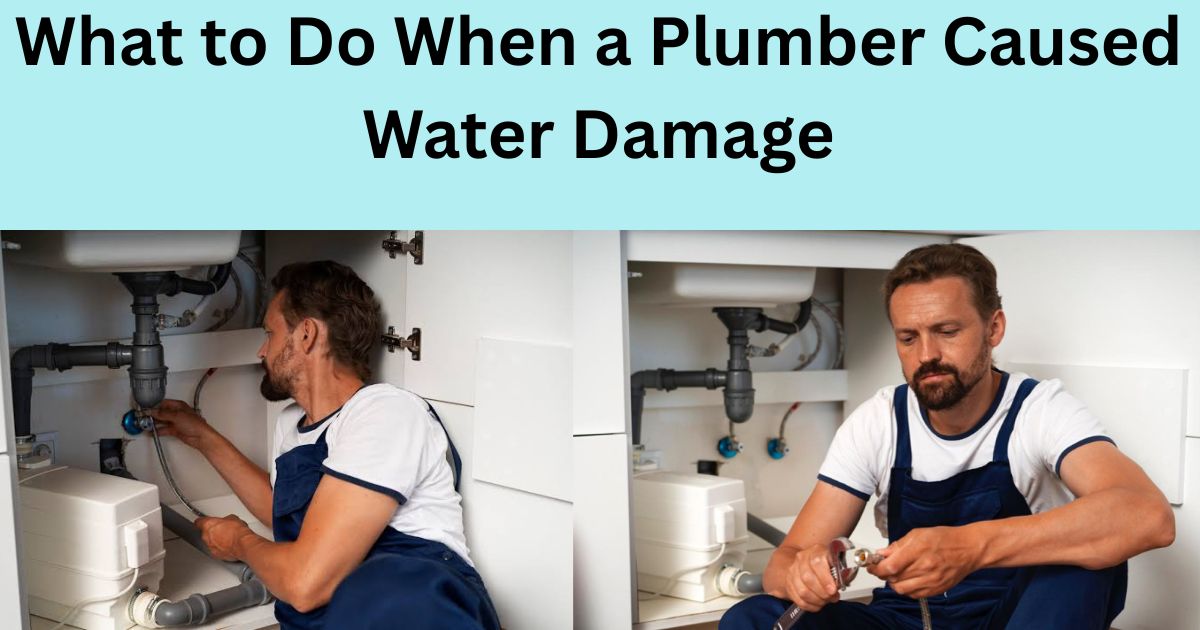Water damage in your home can be devastating, especially when it results from a plumber’s mistake. If you find yourself asking what to do when a plumber caused water damage, this article will guide you step-by-step on how to handle the situation effectively, protect your property, and ensure you get the proper compensation if applicable.
Understanding Water Damage Caused by a Plumber
Plumbers handle critical systems in your home, such as pipes, fixtures, and drainage. When their work goes wrong—like improper installation, faulty repairs, or negligence—it can lead to water leaks or flooding. This water damage can affect walls, floors, ceilings, furniture, and even electrical systems, potentially causing health risks like mold growth.
Recognizing that a plumber caused the damage is the first step toward resolving the issue responsibly.
Immediate Actions to Take When a Plumber Causes Water Damage
1. Stop the Water Flow
If water is actively leaking or flooding, the first priority is to stop the water flow. This may involve:
- Turning off the main water supply to your house.
- Shutting off specific valves near the damaged area.
- Calling the plumber immediately to halt further damage if they are on-site.
Stopping the water reduces further harm to your property.
2. Document the Damage
Before cleaning or repairs, document everything:
- Take clear photos and videos of the water damage.
- Note the date, time, and circumstances when the damage occurred.
- Keep copies of any contracts, invoices, or communication with the plumber.
This documentation will be crucial for insurance claims or legal action later.
Notify the Plumber and Discuss the Issue
Contact the plumber who caused the damage and explain the situation calmly. Many professional plumbers have liability insurance and may take responsibility for fixing the damage they caused.
Ask for:
- Immediate repair or damage control services.
- Compensation for damage repair costs.
- Proof of their insurance coverage.
If the plumber refuses to cooperate, you may need to escalate the matter legally.
Assess the Extent of the Water Damage
Once the water is stopped, it’s important to assess the damage carefully. Water can seep into hidden areas causing long-term issues such as:
- Structural weakening of walls and floors.
- Mold and mildew growth.
- Damage to electrical wiring and appliances.
Hire a professional water damage restoration expert to inspect your home thoroughly. They can provide a detailed report and recommend restoration steps.
File an Insurance Claim
If you have homeowner’s insurance, water damage caused by a plumber may be covered under your policy. Steps to file a claim include:
- Contact your insurance company promptly.
- Submit the photos, videos, and reports you gathered.
- Provide details of the plumber’s involvement.
- Get an adjuster to inspect the damage.
Keep records of all communication with your insurer.
Consider Legal Options if Needed
If the plumber denies responsibility or refuses to pay for damages, you might consider legal action. Consult a lawyer experienced in construction or home repair disputes. You may be entitled to:
- Compensation for repair and restoration costs.
- Damages for loss of use of your home or belongings.
- Reimbursement for temporary accommodation if your home is uninhabitable.
Legal options should be a last resort after trying to resolve the issue directly with the plumber and insurer.
Preventing Future Water Damage from Plumbing Work
To avoid repeating the same issue, take these preventive steps:
- Always hire licensed and insured plumbers with good reviews.
- Get multiple quotes and check references.
- Ensure written contracts clearly state liability and warranty terms.
- Monitor the plumber’s work during and after completion.
- Conduct regular maintenance on plumbing systems to catch issues early.
Cleaning Up After Water Damage
If water damage has occurred, prompt cleanup is essential to minimize harm:
- Use fans and dehumidifiers to dry out the affected areas.
- Remove soaked carpets, drywall, and furniture that can’t be salvaged.
- Clean surfaces with disinfectants to prevent mold.
- Wear protective gear if mold is suspected.
Professional restoration companies can handle extensive damage safely and efficiently.
What to Avoid When Facing Water Damage
- Don’t delay reporting the damage to the plumber or insurer.
- Avoid DIY repairs beyond your expertise to prevent worsening the damage.
- Don’t ignore signs of mold or structural issues.
- Avoid emotional confrontation with the plumber; keep communications professional and documented.
Summary and Final Advice
When wondering what to do when a plumber caused water damage, your best approach is:
- Stop the water and minimize damage.
- Document everything thoroughly.
- Notify the plumber and discuss responsibility.
- Get professional damage assessment and cleanup.
- File insurance claims promptly.
- Consider legal help if the plumber refuses to cooperate.
- Take preventive steps for future plumbing work.
Handling water damage caused by a plumber requires patience and systematic action to protect your home and your rights.







